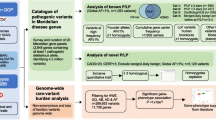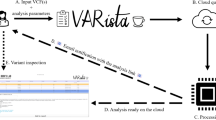Abstract
With rapidly declining costs, whole genome sequencing is becoming feasible for widespread use. Although cost-effectiveness is driving increased use of the technology, comprehensive recommendations on how to handle ethical dilemmas have yet to reach a consensus. In this article, Sam shares her experience of undergoing whole genome sequencing. Despite the deeply private nature of the test, the results do not solely belong to Sam; her identical twin sister, Arielle, shares virtually the same genome and received results without a formal consent process. This article explores their parallel experiences as a way of highlighting the controversial ethics of a private test with familial implications.
Similar content being viewed by others
References
Ayuso, C., Millan, J. M., Mancheno, M., & Dal-Re, R. (2013). Informed consent for whole-genome sequencing studies in the clinical setting. Proposed recommendations on essential content and process. European Journal of Human Genetics, 21(10), 1054–1059. doi:10.1038/ejhg.2012.297.
Christensen, K. D., Dukhovny, D., Siebert, U., & Green, R. C. (2015). Assessing the costs and cost-effectiveness of genomic sequencing. Journal of Personalized Medicine, 5(4), 470–486. doi:10.3390/jpm5040470.
Cordero, P., & Ashley, E. A. (2012). Whole-genome sequencing in personalized therapeutics. Clinical Pharmacology and Therapeutics, 91(6), 1001–1009. doi:10.1038/clpt.2012.51.
Genetic Information Nondiscrimination Act of 2008, Pub. L. 110-223, 122 Stat. 881, codified as amended in scattered sections of 26, 29, and 42 U.S.C. https://www.gpo.gov/fdsys/pkg/PLAW-110publ233/html/PLAW-110publ233.htm. Accessed date May 6, 2016.
Godard, B., Hurlimann, T., Letendre, M., Egalite, N., & INHERIT BRCAs (2006). Guidelines for disclosing genetic information to family members: from development to use. Familial Cancer, 5(1), 103–116. doi:10.1007/s10689-005-2581-5.
Green, R. C., Rehm, H. L., & Kohane, I. (2013). Clinical Genome Sequencing. In G. S. Ginsburg & H. F. Willard (Eds.), Genomic and personalized medicine (2nd ed., pp. 102–122). London and Waltham: Elsevier/Academic Press.
Green, R. C., Lautenbach, D., & McGuire, A. L. (2015). GINA, genetic discrimination, and genomic medicine. The New England Journal of Medicine, 372(5), 397–399. doi:10.1056/NEJMp1404776.
Hankins, G. V., & Saade, G. R. (2005). Factors influencing twins and zygosity. Paediatric and Perinatal Epidemiology, 19(Suppl 1), 8–9. doi:10.1111/j.1365-3016.2005.00609.x.
Jackson, M. (2015). Veritas genetics breaks $1,000 whole genome barrier [press release]
Jamal, S. M., Yu, J. H., Chong, J. X., Dent, K. M., Conta, J. H., Tabor, H. K., & Bamshad, M. J. (2013). Practices and policies of clinical exome sequencing providers: analysis and implications. American Journal of Medical Genetics. Part A, 161A(5), 935–950. doi:10.1002/ajmg.a.35942.
Kircher, M., & Kelso, J. (2010). High-throughput DNA sequencing--concepts and limitations. BioEssays, 32(6), 524–536. doi:10.1002/bies.200900181.
McLean, N., Delatycki, M. B., Macciocca, I., & Duncan, R. E. (2013). Ethical dilemmas associated with genetic testing: which are most commonly seen and how are they managed? Genetics in Medicine, 15(5), 345–353. doi:10.1038/gim.2012.138.
Morell, R. J., Brewer, C. C., Ge, D., Snieder, H., Zalewski, C. K., King, K. A., Drayna, D., et al. (2007). A twin study of auditory processing indicates that dichotic listening ability is a strongly heritable trait. Human Genetics, 122(1), 103–111. doi:10.1007/s00439-007-0384-5.
Platt, J., Cox, R., & Enns, G. M. (2014). Points to consider in the clinical use of NGS panels for mitochondrial disease: an analysis of gene inclusion and consent forms. Journal of Genetic Counseling, 23(4), 594–603. doi:10.1007/s10897-013-9683-2.
Roche, M. I., & Berg, J. S. (2015). Incidental findings with genomic testing: implications for genetic counseling practice. Current Genetic Medicine Reports, 3(4), 166–176. doi:10.1007/s40142-015-0075-9.
Sanderson, S. C., Linderman, M. D., Suckiel, S. A., Diaz, G. A., Zinberg, R. E., Ferryman, K., Wasserstein, M., et al. (2016). Motivations, concerns and preferences of personal genome sequencing research participants: baseline findings from the HealthSeq project. European Journal of Human Genetics, 24(1), 153. doi:10.1038/ejhg.2015.179.
Sijmons, R. H., Van Langen, I. M., & Sijmons, J. G. (2011). A clinical perspective on ethical issues in genetic testing. Accountability in Research, 18(3), 148–162. doi:10.1080/08989621.2011.575033.
Wolf, S. M., Branum, R., Koenig, B. A., Petersen, G. M., Berry, S. A., Beskow, L. M., Daly, M. B., et al. (2015). Returning a research Participant's genomic results to relatives: analysis and recommendations. The Journal of Law, Medicine & Ethics, 43(3), 440–463. doi:10.1111/jlme.12288.
Acknowledgments
The authors thank Medullan for their generous trainee sponsorship and Ms. Tammy Kammin, Ms. Susan Price, Mr. Adam Nitenson, Ms. Erica Ramos, Dr. Robert Green, and Dr. Robert Morell for their input. This work was supported by the NSF Graduate Research Fellowships DGE1144152 (SLPS) and DGE0228243 (ASN). Any opinion, findings, and conclusions or recommendations expressed in this material are those of the authors and do not necessarily reflect the views of the National Science Foundation.
Author information
Authors and Affiliations
Corresponding author
Ethics declarations
Conflict of Interest
Samantha L.P. Schilit and Arielle Schilit Nitenson declare that they have no conflict of interest.
Human Studies and Informed Consent
This article does not contain any studies with human participants performed by any of the authors.
Animal Studies
No animal studies were carried out by the authors for this article.
Rights and permissions
About this article
Cite this article
Schilit, S.L., Schilit Nitenson, A. My Identical Twin Sequenced our Genome. J Genet Counsel 26, 276–278 (2017). https://doi.org/10.1007/s10897-016-0046-7
Received:
Accepted:
Published:
Issue Date:
DOI: https://doi.org/10.1007/s10897-016-0046-7




